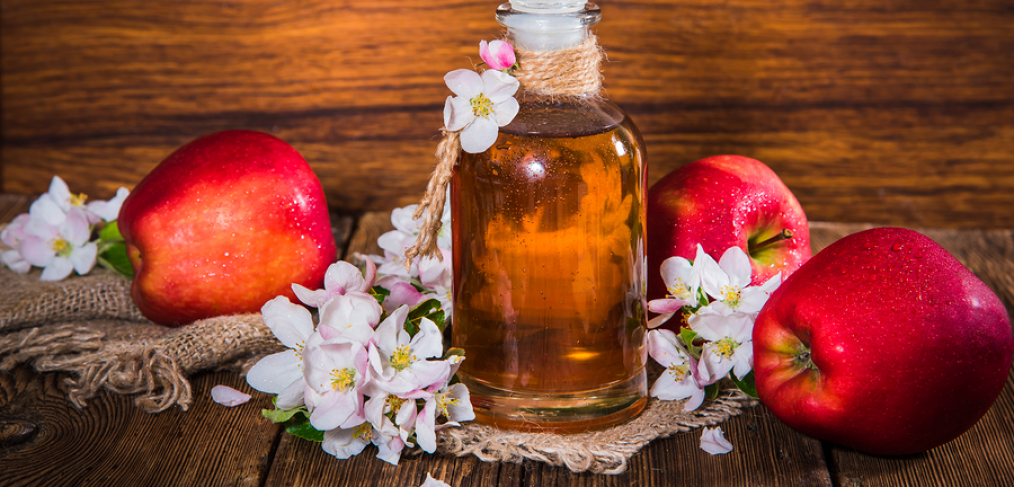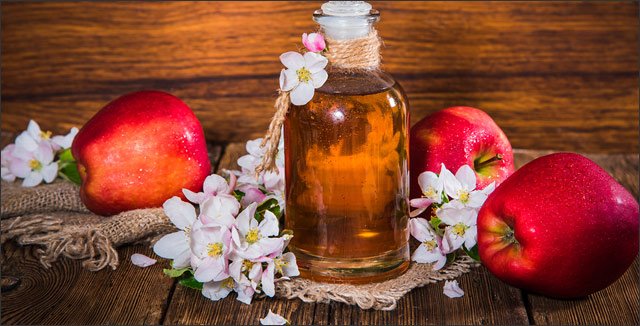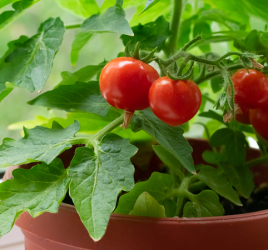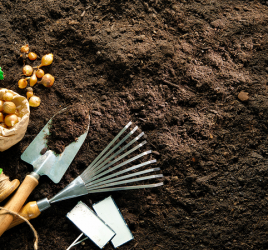
Surprising Uses of Vinegar: Detoxify Your Garden and Your Home

Are you concerned by how many chemicals you’re exposed to every day in your food, your environment, and cleaning supplies?
Maybe you’ve made a commitment to getting rid of pesticides and chemicals in your life – at least the ones you can control. Or maybe you’re not sure where to start. You know it would be better for the environment not to use bleach, but you’re not sure if anything else will get the job done.
In that case, let me tell you about the amazing uses of vinegar for your home and garden.
Amazing Uses of Vinegar for Your Home and Garden
Remove weeds
You can use pure white vinegar to kill weeds and tufts of grass that grow in the cracks of your garden walls or walk ways. Simply spray them directly and they will dry up and die in 2-3 days. No need to use toxic herbicides.
Beware, though. Vinegar can kill your grass too and, if too much is applied, can make the soil infertile if you put too much in it, so be careful not to spray on your lawn unless you want to replant the grass.
Repel Ants
Ants hate vinegar! It’s a very effective way to keep them away. Mix equal amounts of water and vinegar and spray the solution on any ant hills you find in your garden. You can use white vinegar or apple cider vinegar.
Inside, spray counter-tops, sink, and windows with this mixture. The strong scent – which dissipates in a few minutes for human noses and repels ants by making them avoid those places. Even better, vinegar disinfects surfaces as well as bleach, but is non-toxic. So you can clean the kitchen while you’re repelling ants. I call that a win!
Clean Clay Pots
Many gardeners love clay pots. Their natural properties keep soil cool in summer, allow plants to breathe and look attractive in all kinds of settings. As clay pots age, they absorb calcium and other minerals from water and become discolored.
After you’ve scrubbed off any loose dirt in a bucket of water, soak your clay pot in this mixture: 1 cup 5% acidity white vinegar per 4 cups water. The less vinegar, the longer you’ll have to soak it. It should fizz and bubble – that’s how you know it’s eating away the minerals!
Soak again in plain water to get rid of the vinegar or send it through the dishwasher. It should be good as new. You can use straight vinegar on tough spots: just spray and scrub until the white streak is gone.
Repel Garden Pests
Guess what rodents, moles, cats, dogs, rabbits, and deer all have in common? Well, besides wanting to destroy your garden? They all hate the strong smell of vinegar.
Soak a few rags in white vinegar and place them on stakes around where you’re noticing the vandalism. Keep re-soaking every week for maximum repellent action.
Getting rid of snails and slugs with vinegar is just slightly more involved. Because these plant-eating creatures like to move around at night when it’s cool, you have to be sneaky to catch them.
Prop a board with a stick in your yard to create a shelter from the sun and wait until they congregate there in the daytime. Spray directly with vinegar and it will dissolve them. Watch out, though, vinegar can also kill your grass so you might want to try it on your driveway.
You can repel insects that are eating your plants with a more diluted form of vinegar that won’t hurt the leaves. Use 1 part vinegar to 3 parts water in a spray bottle and add 1 teaspoon of dish detergent. Spray on the leaves of your bug-eaten plants. Just be careful not to up the quantity of the vinegar if it’s not working or it’ll kill the plant.
Fruit and House Fly Traps
In late summer, flies can drive you insane! Make this bait to use indoors or outdoors: 1 cup water, half a cup of apple cider vinegar, ¼ cup sugar, and 1 tablespoon molasses. Mix it all together and put in an empty container and hang from a tree or by a window indoors. Watch the flies get attracted and trapped by this clever device – no chemicals needed!
Save Plants from Fungus
If you have plants suffering from fungus and mold, you can protect them with a simple vinegar fungicide. Brew some chamomile tea and add two teaspoons of vinegar. Spray this solution on moldy plants – it’s totally safe for the plants!
Feed Your Acid Loving Plants
If you have rhododendrons, azaleas or gardenias you know they love acidic conditions. You can spray them with a quick pick-me-up: 1 cup of white vinegar in a gallon of water and watch them wake up.
Extend the Life of Cut Flowers
Add 2 tablespoons of vinegar and a teaspoon of sugar per liter of water for any cut flowers you want to keep fresh for as long as possible.
Cleaning
Of course, the non-toxic cleaning properties of vinegar make it perfect for cleaning many surfaces – including your skin and hair. It can dissipate the stink from anything without leaving a lasting stink itself. Here’s a list of ideas:
- Clean the rust from your garden tools with straight vinegar.
- Clean birdbaths and birdhouses with a 25% vinegar 75% water solution.
- Disinfect cutting boards or dishes after washing if you have no dishwasher.
- Disinfect your toilet bowl and bathroom surfaces.
- Clean floors and windows with diluted vinegar.
- Rid carpets of pet stains.
- Spot treat clothing stains for 5 minutes before throwing in the wash.
- Use as a degreaser for kitchen surfaces.
- Polish brass, bronze and chrome – gets rid of soap scum.
- Rid your hands of that dry feeling after working in the dirt – it neutralizes the lime from soil.
- Can be used as a natural deodorant and hair rinse to keep hair soft and shiny – it also helps treat dandruff, candida, and bacterial scalp problems.
- Use to disinfect and freshen cloth diapers – and also sprayed on baby bottoms to prevent rashes and bacterial infections.
- Works as a fabric softener – no need to use dryer sheets.
- Works as a facial astringent.
- Spray on smelly feet.
- Spray diluted solution on your legs or face after shaving to prevent irritation caused by bacteria.
- Vinegar works as a great after-sun spray to treat sunburns.
Take Away
These are just some of the great uses for vinegar in your garden and home. If you want to get rid of toxic chemicals in your home or just want to save money, vinegar is one of the best, cheapest, and most versatile products you can have at home.
Your Turn
What is your favorite way to use vinegar in your garden or home?



